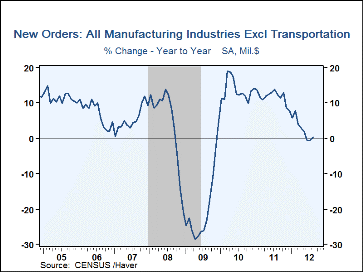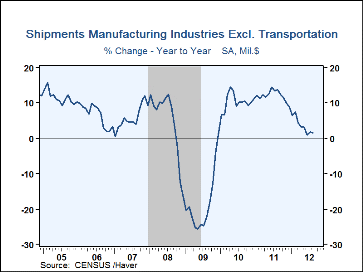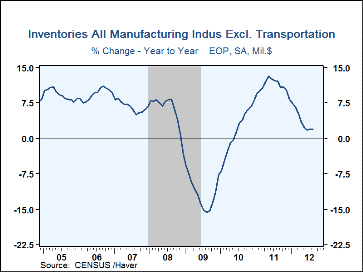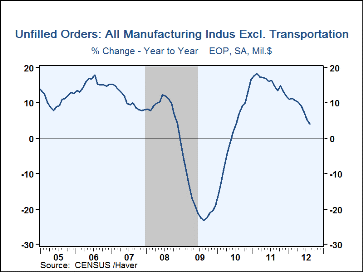 Global| Oct 04 2012
Global| Oct 04 2012U.S. Factory Orders Plunge With Durables
by:Tom Moeller
|in:Economy in Brief
Summary
Factory sector new orders collapsed 5.2% during August following an upwardly revised 2.6% July gain. Expectations were for a 5.0% drop according to Bloomberg. Durable goods orders fell an unrevised 13.2%, due to cancelled aircraft [...]
Factory sector new orders collapsed 5.2% during August following an upwardly revised 2.6% July gain. Expectations were for a 5.0% drop according to Bloomberg. Durable goods orders fell an unrevised 13.2%, due to cancelled aircraft bookings. Excluding transportation, total factory orders rose 0.7% (0.3% y/y). Nondurable goods orders (which equal shipments) jumped 2.2% (1.2% y/y). That was led by a 7.2% rise (6.3% y/y) in petroleum shipments with higher prices. Shipments of textile products gained 1.8% (6.5% y/y), basic chemicals shipments rose 0.5% (-3.5% y/y) but shipments of apparel fell 0.2% (+3.8% y/y).
Inventories in the factory sector again rose 0.6% during August. However, the 3.4% y/y rate of inventory accumulation was down from its 13.6% rate one year ago. Lower rates of accumulation occurred across industries. Unfilled orders fell 1.7% (+5.4% y/y) with the drop in new orders.
The factory sector figures are available in Haver's USECON database. The expectation figure is in AS1REPNA.
Housing Rebounds, but Forward-Looking Indicators Cause Concern from the Federal Reserve Bank of Dallas is available here.
| Factory Sector- NAICS Classification | Aug | Jul | Jun | Y/Y | 2011 | 2010 | 2009 |
|---|---|---|---|---|---|---|---|
| New Orders | -5.2 | 2.6 | -0.5 | -2.5 | 11.8 | 18.0 | -23.1 |
| Shipments | -0.3 | 1.9 | -1.2 | 2.6 | 11.8 | 11.2 | -18.8 |
| Inventories | 0.6 | 0.6 | -0.1 | 3.4 | 9.4 | 8.8 | -6.8 |
| Unfilled Orders | -1.7 | 0.7 | 0.4 | 5.4 | 10.3 | 9.6 | -19.5 |
Tom Moeller
AuthorMore in Author Profile »Prior to joining Haver Analytics in 2000, Mr. Moeller worked as the Economist at Chancellor Capital Management from 1985 to 1999. There, he developed comprehensive economic forecasts and interpreted economic data for equity and fixed income portfolio managers. Also at Chancellor, Mr. Moeller worked as an equity analyst and was responsible for researching and rating companies in the economically sensitive automobile and housing industries for investment in Chancellor’s equity portfolio. Prior to joining Chancellor, Mr. Moeller was an Economist at Citibank from 1979 to 1984. He also analyzed pricing behavior in the metals industry for the Council on Wage and Price Stability in Washington, D.C. In 1999, Mr. Moeller received the award for most accurate forecast from the Forecasters' Club of New York. From 1990 to 1992 he was President of the New York Association for Business Economists. Mr. Moeller earned an M.B.A. in Finance from Fordham University, where he graduated in 1987. He holds a Bachelor of Arts in Economics from George Washington University.
More Economy in Brief
 Global| Feb 05 2026
Global| Feb 05 2026Charts of the Week: Balanced Policy, Resilient Data and AI Narratives
by:Andrew Cates










